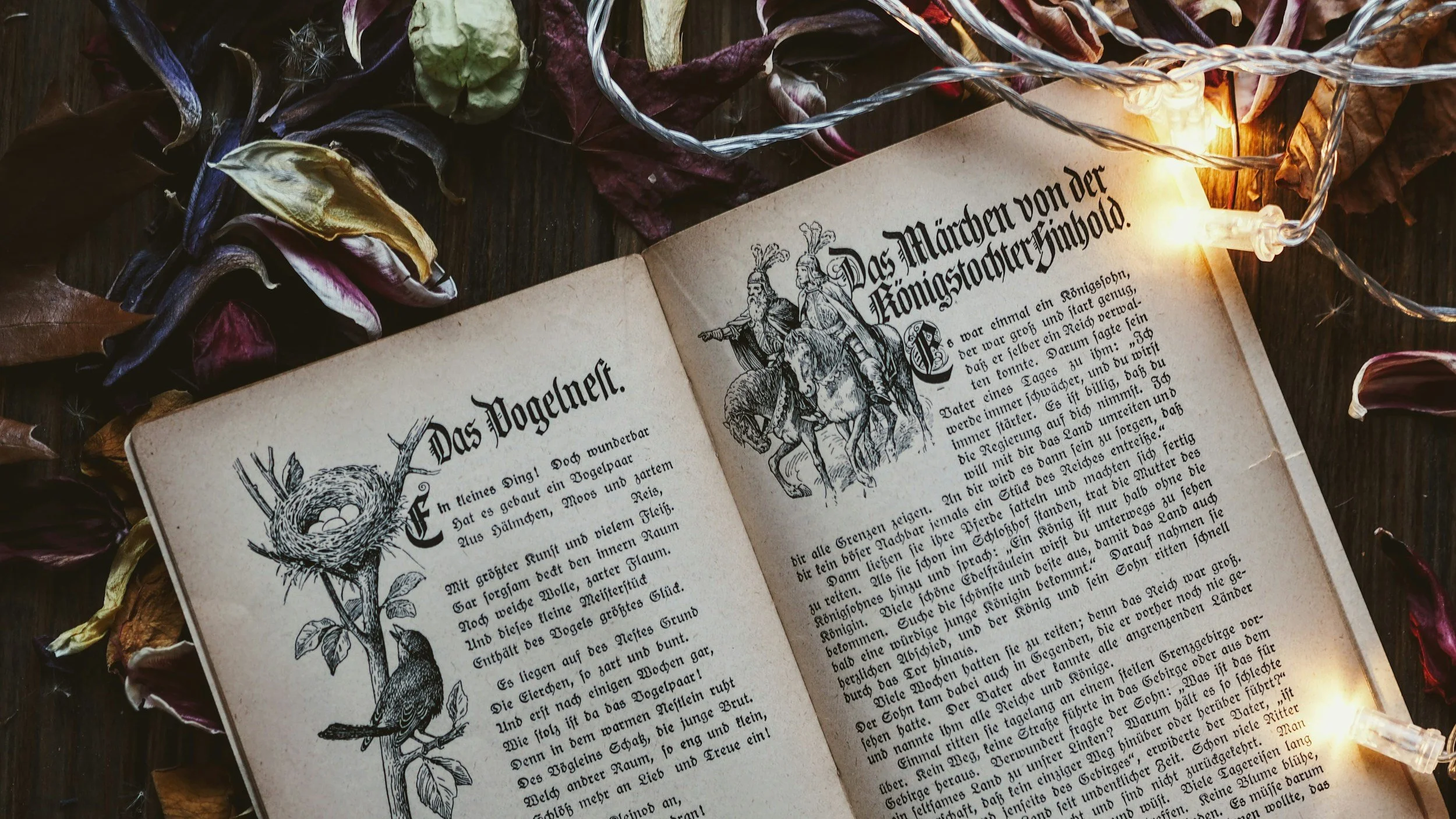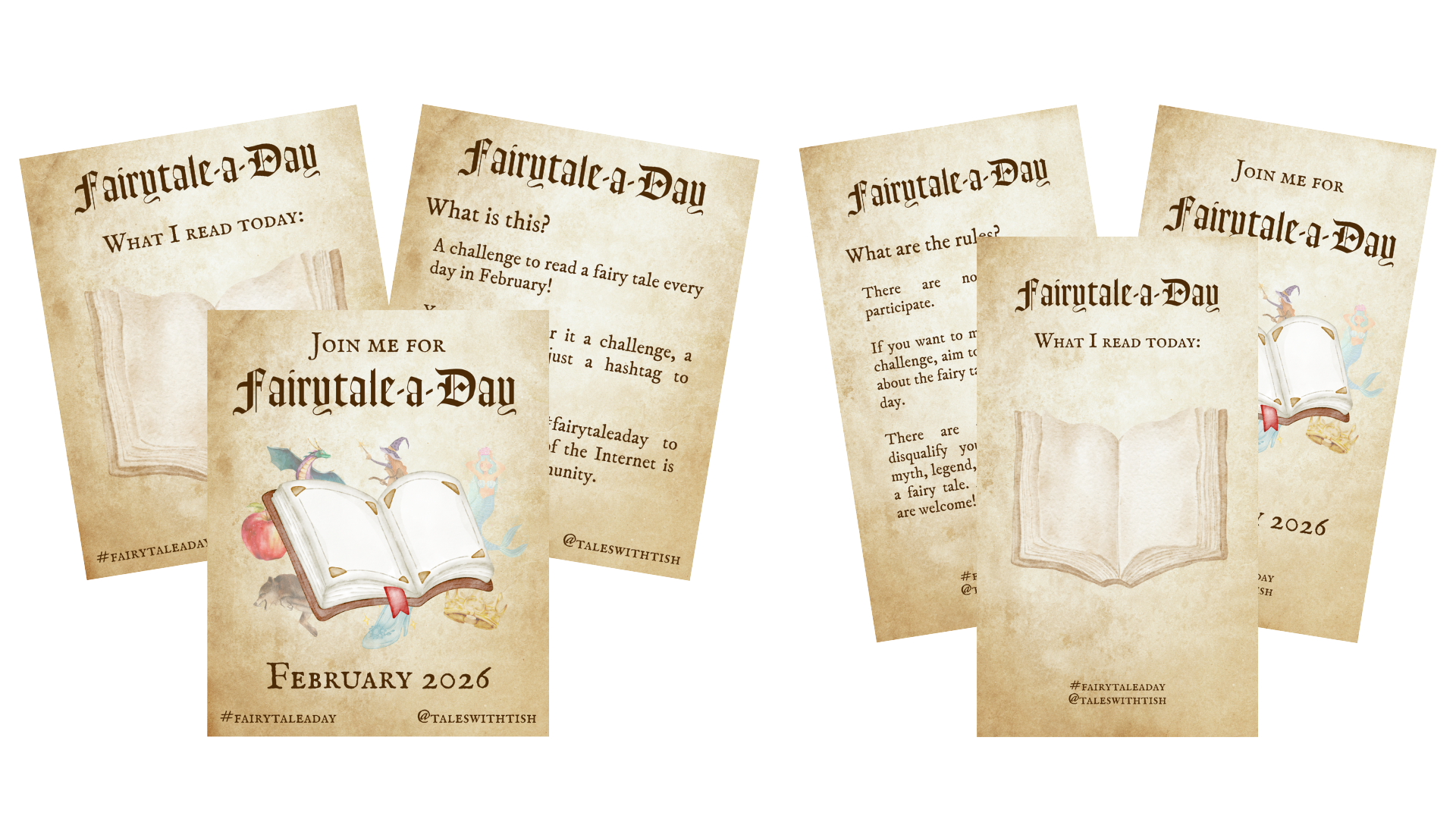read a fairy tale every day in February
#fairytaleaday
What is Fairytale-a-Day?
I want to read a fairy tale every day! I’m challenging myself to keep up the habit for a full month, and I thought it would be fun to share by posting on Instagram and encouraging others to join me: as a daily challenge, or just a reminder to read fairy tales more often.
I have a bookshelf full of fairy tale collections, of which I’ve read only a fraction. I want to read more of what I already have, reading tales I haven’t read before. I encourage you to read tales you’re unfamiliar with, or revisit versions of childhood favourites.
If you’d like to join me, you can consider it a challenge, a community, or just a hashtag to follow.
When is it happening?
February 1-28, 2026. I chose February this year for a few reasons. It’s a nice, even 28 days (9.6% less of a challenge than a 31-day month!). February contains two fairy tale-related holidays. National Storytelling Week is Feb. 2-8, and Tell a Fairy Tale Day is Feb. 26. As a bonus this year, we can get spooky on Friday the 13th, as well.
Where online is it happening?
I’m posting about my fairy tales on Instagram and Substack, and I encourage you to share with me and others on those platforms. Tag me and/or use the #fairytaleaday hashtag if you’d like to get my attention and be reposted. You can take #fairytaleaday to whichever corner of the Internet is your fairy tale community. Use the social media assets below if you want some pre-made graphics to help highlight your tales.
What are the challenge rules?
There are no rules to participate. You can share photos, videos, or writing however often you like about however many fairy tales you’ve read to whichever platforms you like. Use the #fairytaleaday hashtag to be found by others!
If you want to make it a public challenge, aim to post every day about the fairy tale you read that day.
There are no Fairytale-a-Day referees to disqualify you for reading a myth, legend, or fable instead of a fairy tale. (Or even a new fairy tale story, like mine.) All folk narratives are welcome!
Is there a participation prize?
Yes! This year there is a prize! If you log a fairy tale every day of February, you will be entered to win a copy of Beneath the Moon: Fairy Tales, Myths, and Divine Stories from Around the World by Yoshi Yoshitani. This collection contains abridged retellings of 78 fairy tales, myths, and folk tales from around the world. And some of the most beautiful fairy tale illustrations you’ll ever see. It’s a beautiful addition to even the most robust fairy tale collection—or a great start to one!
Entry instructions:
Fill out this form with your info and the name of the tale you read each day. There is a field for each day of February, so you can fill it out once a day, once a week, or put in every tale on the last day. Multiple entries will be consolidated. (I’m trying to make it flexible, so you can have a daily routine to help you keep up the habit, or track it yourself and enter once.)
On March 2, I will select a winner randomly. Every day you fill out will count as an entry (whether they’re in one form entry or several). The more you read, the higher your chances of winning!
What is a fairy tale?
Here’s my brief explanation (also available in video form): Fairy tales, also known as “wonder tales,” are defined by, as the name suggests, the inclusion of magic such as fairies and other wonderous creatures and impossible events. They are short stories that take place in a non-specific time and place (i.e. once upon a time). Traditionally oral tales, the fairy tales we know now were written down at some point by collectors like the Brothers Grimm or come from original literary fairy tales like the folklore-influenced Hans Christian Andersen stories.
Here’s a specific definition from Sara Cleto of The Carterhaugh School of Folklore and the Fantastic:
“Fairy tale” is the popular, or lay, term for what folklorists often refer to as “International Wonder Tales” or “Märchen.” … In The Folktale (1946) Stith Thompson describes them as tales “involving a succession of motifs or episodes. [They move] in an unreal world without definite locality or definite creatures and [are] filled with the marvelous. In this never-never land, humble heroes kill adversaries, succeed to kingdoms and marry princesses” (Thompson 8). They generally involve some type of quest or search that the hero or heroine must undertake. … Fairy tales can be oral or literary, and tales often migrate between these seemingly separate incarnations. Fairy tales can be used to instruct or entertain, to caution and to inspire, to reinstate the status quo or to incite rebellion – they are an incredible versatile form that adapts to the needs and values of the teller and their culture.
But remember: for this challenge (including entries for the prize), all folk narratives are allowed and encouraged!
I hope to see you out on the fairy mound reading tales… or maybe just on Instagram.
Resources
Read or listen to fairy tales for free!
University of Pittsburgh: Folklore and Mythology Electronic Texts
WikiSource: Fairy Tales (and Wikipedia pages of individual tales often link to a source to read)
Some of these resources will link through to even more free online texts to read. And, of course, check out your local library!
Social Media Assets
Use these images to share with your followers that you are participating in Fairytale-a-Day, and as templates for your daily sharing of what you read!


